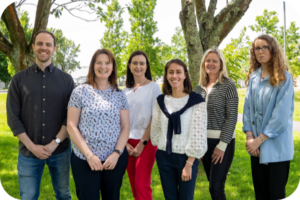What is the CDP-CDP?
The Collaborative Doctoral Programme in Chronic Disease Prevention (CDP-CDP) is a structured doctoral programme training six SPHeRE scholars to become future leaders in chronic disease research, implementation, and policy development. We are Eanna (Health Psychologist), Pauline (Dietitian), Irene (Nurse), Márcia (Health Psychologist), Clair (Physiotherapist), and Edel (Pharmacist). Our programme is funded by the Health Research Board (HRB) and supported by a consortium of national and international experts in chronic disease prevention.

From L-R – CDP-CDP PhD Scholars – Eanna Kenny, Pauline Dunne, Irene Gibson, Márcia Carvalho, Clair Haseldine, Edel Burton
What is PPI?
PPI stands for Patient and Public Involvement in research. This means that the research is carried out ‘with’ or ‘by’ members of the public rather than ‘to’, ‘about’ or ‘for’ them1. Involving the public and patients in research means the people who are affected by the issue being studied can directly influence the research that is being carried out. As a result, the research should be more relevant and sensitive to their needs. For us as PhD students this involvement can provide perspective and oftentimes very practical advice at all stages of our studies.
What is the role of PPI in the CDP-CDP?
Our programme has been committed to PPI from the outset to enhance the relevance, quality and impact of the CDP-CDP. There is a dedicated CDP-CDP PPI lead, Dr Oonagh Meade (University of Galway) who together with Edel Murphy (National programme manager for the PPI Ignite Network) and PPI contributors, provide support and training.
Through a series of PPI focused workshops and Summer Schools we had the opportunity to present our research plans from an early stage and to receive very useful feedback from PPI contributors. Importantly, this training gave us the knowledge, support, and confidence to set up our own PPI panels, with the formation of groups being tailored to the needs of our individual research projects. Each of our six PhD projects now benefits from the involvement of PPI contributors.
Why did we create guidance for PPI?
Among the six CDP-CDP scholars we all have different experiences with PPI. Some of us are working with newly formed PPI panels, some with existing groups, and others have the opportunity to work with both. To ensure best practice and that our approach to PPI is consistent, equitable and transparent across the different PhD programmes we wanted to create a guidance. This document has also allowed us to capture lessons learned so far.
Another reason for developing this document was to provide a reference point for other PhD scholars and future HRB Collaborative Doctoral Awards (CDAs). Our SPHeRE and CDP-CDP training has taught us the benefit of peer learning and support. Thus, we feel documenting our learning may not only enrich the value of PPI in our own projects but also that of future scholars. As an example, the PPI impact log from the Multimorbidity SPHeRE Collaborative Doctoral Award is referenced in our document.
What’s included in the guidance document?
We worked with Dr Oonagh Meade, PPI lead on the CDP-CDP, and PPI contributors to put together this document. The terms guidance document is aligned with both the: HSE guide to PPI in HSE research and the UK National Institute for Health Research (NIHR) template for PPI Terms of Reference. This approach facilitates appropriate and consistent PPI practices. The resulting document contains guidance on ethical considerations, recruitment of PPI contributors, data privacy and management, practicalities of engaging with PPI contributors and tracking the impact of PPI in our research.
The guidance document also includes a reflexivity section with reflections from us as scholars on our PPI journeys to date. We felt it was important to document our thoughts, experiences and learnings as we progress our PPI and PhD journeys. It gave us the opportunity to critically reflect on our own approaches, perspectives, and outlooks. After reflecting on our experiences individually, and at our monthly CDP-CDP scholars’ meetings we discuss the most prevalent lessons we have learned. These range from practical to personal issues. The fact that most of our PPI engagement to date has occurred during pandemic times posed its own challenges. As a result, most of us have experience engaging with PPI contributors online, in-person and through other media.
Our CDP-CDP PPI guidance document can be found here:
https://www.universityofgalway.ie/cdp-cdp/ourresearch/ppi/ppiresources/
Where to next?
We are currently in the process of disseminating information on this PPI guidance document. We believe that a balance of practical and reflective content is important when discussing engagement with PPI contributors. As a result, we hope that this guidance document will inform other PhD scholars and research consortia, such as CDAs.
We are very much looking forward to continuing our joint PPI journeys and discussing our PPI guidance document with colleagues over the coming months!
References
1. National Institute for Health and Care Research (NIHR). ‘What is public involvement in research’? Available at: https://www.nihr.ac.uk/documents/briefing-notes-for-researchers-public-involvement-in-nhs-health-and-social-care-research/27371[Accessed Oct 27 2022].

| Edel Burton is a Clinical Pharmacist and HRB SPHeRE PhD Scholar on the Collaborative Doctoral Programme in Chronic Disease Prevention in University College Cork. Her PhD study focuses on the impact of the COVID-19 pandemic on ambulance response times and emergency call volumes for stroke/TIA. Her PhD supervisors are Dr Claire Buckley (University College Cork), Professor Patricia Kearney (Health Service Executive, University College Cork), and Dr Vera McCarthy (University College Cork). |

| Clair Haseldine is a HRB SPHeRE PhD scholar on the Collaborative Doctoral Programme in Chronic Disease Prevention in University College Cork. Her research is focussing on the implementation of digital diabetes prevention programmes. The project is being supervised by Dr Sheena McHugh (University College Cork), Professor Patricia Kearney (Health Service Executive, University College Cork), Dr Grainne O’Donoghue (UCD) and Dr Fiona Riordan (University College Cork). |

| Pauline Dunne is a Registered Dietitian and HRB SPHeRE PhD Candidate on the Collaborative Doctoral Programme in Chronic Disease Prevention at University College Dublin. Her research will evaluate the feasibility of a system level type 2 diabetes prevention pathway after pregnancy with gestational diabetes. Pauline’s primary supervisor is Associate Professor Sharleen O’Reilly (UCD), with co-supervisors Professor Molly Byrne (University of Galway) and Professor Andrew Murphy (University of Galway). |

| Eanna Kenny is a Health Psychologist and HRB SPHeRE PhD Candidate on the Collaborative Doctoral Programme in Chronic Disease Prevention at the University of Galway. His research aims to optimise digitally delivered cardiac rehabilitation for scalable delivery. This work is being supervised by Professor Molly Byrne (University of Galway), Professor Bill McEvoy (University of Galway) and Dr Jenny McSharry (University of Galway). |

| Irene Gibson is a Cardiovascular Nurse Specialist and HRB SPHeRE PhD Candidate on the Collaborative Doctoral Programme in Chronic Disease Prevention at the University of Galway. Her research is focused on using co-design to develop a digital health intervention for the secondary prevention of cardiovascular disease. Her PhD supervisors are Professor Bill McEvoy (University of Galway), Professor Molly Byrne (University of Galway) and Professor Andrew Murphy (University of Galway). |

| Márcia Carvalho is a Health Psychologist and Hardiman and HRB SPHeRE PhD Candidate on the Collaborative Doctoral Programme in Chronic Disease Prevention at University of Galway. Her project aims to understand how self-management support interventions for type 2 diabetes can better support the maintenance of self-management behaviours using behavioural science. Márcia’s supervisors are Dr Jenny McSharry (University of Galway) and Professor Molly Byrne (University of Galway). |

